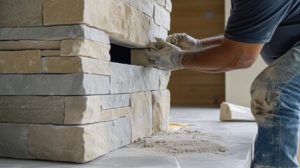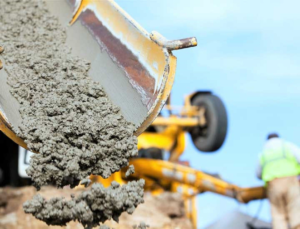Stone Mason Hamilton shapes irregular pieces of rock into accurate, measured shapes for decoration or building. They also maintain horizontal and vertical alignment in their works by using a plumb bob, levels and staked lines.

From raising stones at Stonehenge to preserving medieval church walls, masons have long played a crucial role in construction and restoration. But the trade is not without its pitfalls.
Stone masons build a wide variety of structures with stone. They can create smooth, polished surfaces for a modern aesthetic or more rough, textured finishes for a traditional style. They often work on buildings, bridges, monuments, and more. They are also responsible for repairing and maintaining older structures made from stone. The process of becoming a stone mason can involve taking classes at a trade school, completing an apprenticeship, or training on the job.
There are three main types of stone masons: banker masons, sawyer masons and fixer masons. A banker mason works with larger pieces of stone and can be found at a quarry or tile/flooring store. They are trained to know which stones will cleave by looking at grain patterns and how to cut them with various tools to achieve different types of shapes. A sawyer mason is similar to a banker mason but they cut their own stone from a quarry and are skilled at working with very large blocks of stone (such as slabs for benchtops or floors). They have more skills related to shaping the stone than the banker masons do.
When it comes to fixing or laying stone, a fixer mason is the most common. They are the ones who do the bulk of the laying of stone on construction sites and can be found at construction sites or in a quarry. They can fit and lay a variety of materials such as marble, granite, limestone and more. Fixer masons are often trained to be able to use power tools as well, which can make the job much faster.
In addition to installing stone cladding, masons are also skilled at working with mortar. They can install a variety of different styles of joints, some more structural than others. For example, some masons use an overgrouted finish which involves using a trowel to press mortar over the stone pieces. This type of joint is usually used for structural walls and can help prevent hairline cracks.
Another type of installation that a mason can do is an ashlar line pattern which uses smaller stones set against larger stones to create a more uniform appearance. This is commonly used in walls and can be seen on the Roman Coliseum, the Taj Mahal and many other famous buildings. It is also more difficult than other installations because it requires more attention to detail and the stones must be very consistent in shape and size.
Tools We Use
From the carved symbols painstakingly chipped on cave walls to the granite worktops gleaming in new kitchens, stone has been a valued building material for millennia. Today, the skill of stone masonry continues to play a vital role in construction and restoration. Whether you’re drawn to the hands-on nature of the trade, or the artistic side of carving, stone masonry offers many opportunities for growth and professional satisfaction.
Masonry is a versatile craft that has been used for both decorative and structural purposes. Whether you are building an outdoor stone patio or a grand cathedral, the basic techniques for shaping stones remain the same. Regardless of the size or scope of your project, having the right tools for the job will help you get the job done quickly and efficiently.
There are several types of masonry tools that every mason should have at their disposal. Some, like the trowel, are essential for any masonry job, while others, such as the brick tongs, are designed to make handling multiple bricks at once more efficient and safer. Mason’s level is another essential tool for guaranteeing precise, high-quality masonry work.
In addition to the basic masonry tools, you’ll also need some specialized stonework tools to create more elaborate designs. For example, a letter cutter uses different angles of the chisel to make letters on monuments and gravestones. Training in this skill requires a strong understanding of typography, as well as the layout and purpose of each project.
Another specialized stonework tool is a jet torch. This is a powerful tool that can be used to burn away old mortar, clean concrete surfaces or carve a design into a stone surface. It’s important to know how to use these tools correctly, as they can be extremely dangerous if not handled properly.
Other specialized masonry tools include a wire brush to remove dirt and debris from the surface of a stone, a mason’s level for ensuring bricks or stones are aligned properly, and a set of chisels – a flat chisel for general cutting and shaping, a point chisel for breaking hard materials, and a tooth chisel for detailed work. Lastly, you’ll need a rugged wheelbarrow for hauling bricks, mixing mortar and concrete, or removing construction waste.
Experience We Have
Stone masons have been around for centuries, and their skills are still revered today. They are a vital part of the construction industry and are responsible for creating and repairing a wide range of stone structures, from kitchen bench tops to statues, memorials, and building facades. Their work requires a high level of craftsmanship and an appreciation for the history of this ancient craft.
The career of a stone mason typically begins with an apprenticeship or completing a course at a college or trade school. These courses typically cover topics such as interpreting blueprints and the basics of building, and often lead to an NVQ qualification in Stone Masonry. Many stone masons also choose to complete further qualifications, particularly if they are interested in working on historical buildings and monuments.
Experience gained on a construction site is essential for becoming a stone mason, and it’s possible to find an apprenticeship in this field by contacting local building contractors or searching online. Apprenticeships usually last a year and include a combination of classroom instruction, on-site training, and practical experience. A successful stone mason will be physically fit and have good hand-eye coordination, as well as the ability to read and follow technical blueprints and plans.
While many stone masons will work on a construction site, there are those who prefer to be based in a workshop or studio and focus on carving and other decorative stonework. They will need to be able to use a variety of tools, including small chisels. A stone mason with this specialized skill will have a unique artistic eye and the ability to create detailed designs in stone.
If you are thinking of hiring a stone mason, ask about their timeline for the project and what steps they will take to prepare the site, cut the stones, and install them. Make sure they are able to accommodate your deadlines and are knowledgeable about the best practices for installing stone. You should also ask them what type of mortar they will be using, as this is important for ensuring your stones stay secure over time.
References We Can Provide
From pyramids and cathedrals to outdoor patios and garden walls, the work of skilled stonemasons has shaped civilizations. The craft requires strength, endurance, and manual dexterity, as well as an eye for detail and a profound understanding of the physical properties of different types of stone. The craft also includes a certain amount of artistic expression, as shown by the many sculptures created by stonemasons throughout history.
As with any other type of contractor, it is wise for homeowners to ask about the qualifications of their chosen stone mason before hiring them. Masons who have a good reputation will be happy to share their credentials and provide examples of previous work.
It is important to verify that the mason you are considering has a license to work in your area and that their insurance is current. Ask about worker’s compensation and general liability insurance, as well as any specialized insurance required for a particular project.
Some stonemasons are self-employed, working from a workshop or studio, while others are part of a larger construction team on building and restoration projects. In either case, it is important for you to know the preferred method of payment and whether they accept credit cards, as this will help avoid any problems down the road if something goes wrong during the job.
A quality mason will be able to provide you with a timeline for completion of your project. This will allow you to schedule your own activities around their work and plan accordingly. A mason who is unable or unwilling to give you a timeline for completion should be avoided at all costs.
